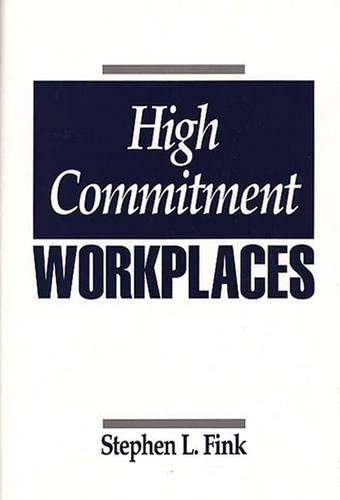
High Commitment Workplaces
(Hardback)
Publishing Details
High Commitment Workplaces
By (Author) Stephen Fink
Bloomsbury Publishing PLC
Praeger Publishers Inc
20th May 1992
United States
Classifications
Tertiary Education
Non Fiction
Organizational theory and behaviour
658.3
Physical Properties
Hardback
232
Description
Commitment in the workplace has been an enduring concern of managers at all levels. On the basis of extensive research and practical work with corporations, Stephen L. Fink establishes a sound basis (Commitment Diagnostic Instrument) for diagnosing essential characteristics of employee commitment and offers practical guidance for remedying situations in which commitment levels constitute problems. Fink examines the differing experiences of corporations with dissimilar personnel approaches. His analysis involves consideration of common, but highly relevant, factors including age, length of service, and educational level. Types of commitments are differentiated, for example, commitment to co-workers is distinguished from commitment to one's specific performance. Managers are guided on the approaches conducive to establish, monitor, and strengthen commitment as a means to a qualitatively better and more productive workplace.
Reviews
"The real key to understanding the transition from traditional to committed workplaces is in the informed and comfortable insight into people. Steven Fink's blend of clinical experience, consultancy, and organizational research coupled with clarity of writing style makes this an exceptional contribution."-Patrick Canavan Vice President and Corporate Director of Human Resources Motorola, Inc.
. . . Contains a wealth of advice aimed at helping managements to move away from compliance-to commitment-based work systems. . . . the book is an excellent source of ideas for managers trying to decide whether to implement new'' management paradigms, as well as for anyone grappling with the problems inherent in creating a learning organization.-Business & The Contemporary World
This is one of the more comprehensive looks at commitment in the workplace in recent years. Fink discusses several dimensions of commitment. For instance, organizational commitment can exist as a result of the work itself, and not necessarily because of the commitment to coworkers or the organization. Based on findings from his research, Fink outlines in detail what factors affect employee commitment and employee performance and pays careful attention to factors creating and reinforcing commitment. Information and data from the research is plentiful. Graduate and advanced undergraduate students would benefit most from this book, along with middle- and upper-level managers.-Choice
." . . Contains a wealth of advice aimed at helping managements to move away from compliance-to commitment-based work systems. . . . the book is an excellent source of ideas for managers trying to decide whether to implement new'' management paradigms, as well as for anyone grappling with the problems inherent in creating a learning organization."-Business & The Contemporary World
"This is one of the more comprehensive looks at commitment in the workplace in recent years. Fink discusses several dimensions of commitment. For instance, organizational commitment can exist as a result of the work itself, and not necessarily because of the commitment to coworkers or the organization. Based on findings from his research, Fink outlines in detail what factors affect employee commitment and employee performance and pays careful attention to factors creating and reinforcing commitment. Information and data from the research is plentiful. Graduate and advanced undergraduate students would benefit most from this book, along with middle- and upper-level managers."-Choice
Author Bio
STEPHEN L. FINK is Professor of Management at the Whittemore School of Business and Economics at the University of New Hampshire in Durham. In addition to his research and teaching, Dr. Fink is a consultant for corporations and is the author of articles and textbooks in organizational behavior and management.
